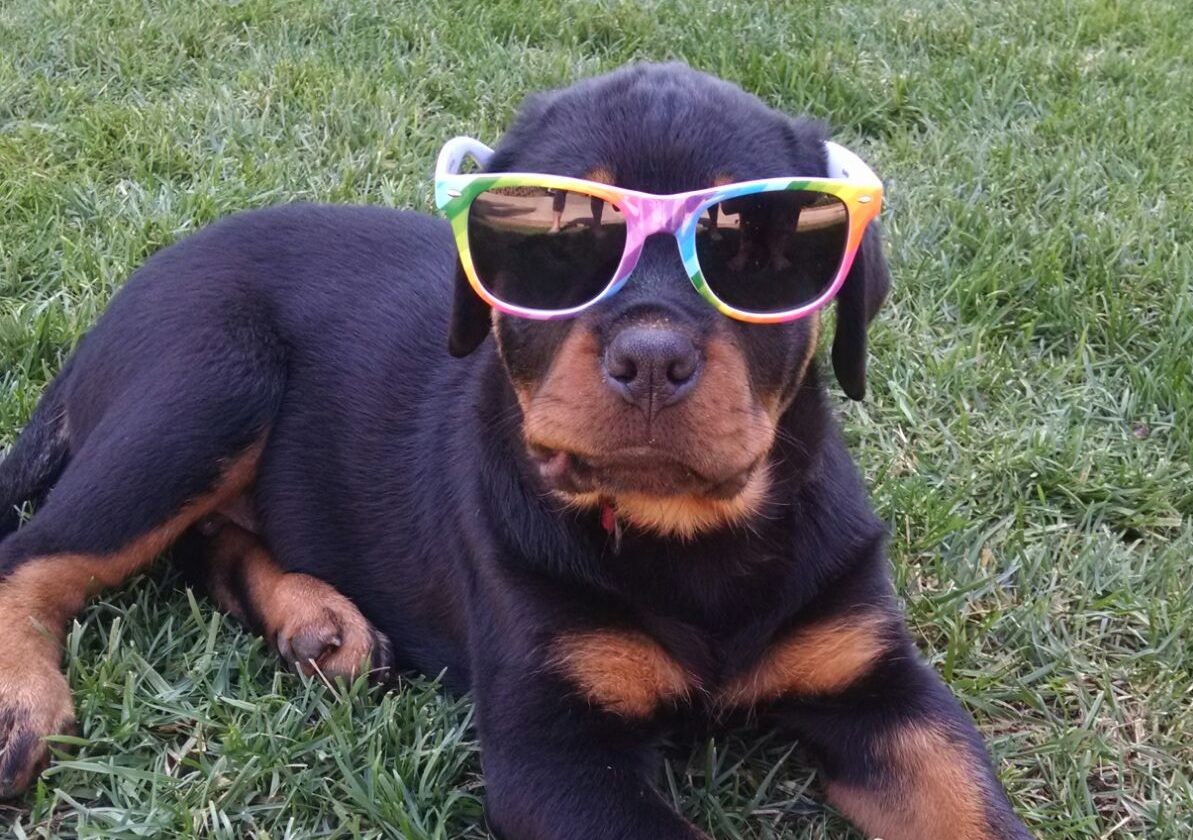When I stepped out of the car and onto the driveway of my parent’s home in San Diego, I was tackled by someone four legged and furry. He pinned me to the ground, licking my face and nipping at my nose. After a good thirty-second struggle, I pulled him off and took a good look. A rottweiler puppy stared back at me. Hazel eyes wide in his soft black face, the puppy dug his velvety snout into my armpit, which must have smelled fascinating after 30 hours on a plane. He sniffed my clothes, exploring the scent of airports and foreign dust. His short whiskers tickled skin beneath the fabric.
His name is Ranger. My parents adopted him on Christmas Day. At five months old, he is already a stubby fifty pounds. He’s the type to inspire love at first sight, which filled me with guilt. When I left for Nepal in October, we were grieving the death of our last dog, Charger (not for the football team), who died a few years too soon. For me, Charger wasn’t replaceable. I couldn’t let a new dog into my life as if nothing had happened.
Charger’s death marked our family’s first dog hiatus since 1996. During these sad, dogless days, no one in the family knew how to spend mornings and evenings. There was no dog to walk or feed. Some of us took to watching TV at night. Sometimes we even ate dinner as a family. Though these dinners were always somewhat boring; no one had any doggie stories from the morning walk to share. No tales about how Charger found a dead rabbit, or how the huskie next door started a neighborhood wide howl fest. Our conversations were filled with mundane, human things, like how work was, what traffic was like, or — should we get desperate — someone might say something about the two birds that live with us, grasping for a nonhuman to please help us.
We’re not very good at showing affection to one another as a family, but none of us seem to be able to get enough from the dog. Though we very rarely hug one another — usually only before and after long periods apart — the dog gets hugs, kisses, snuggles, and baby talk from all six of us. I can’t remember the last time I gave someone in my family an affectionate kiss on the cheek, but the new puppy can lick my face until the end of next week if he wants too. During the eight-month dog hiatus, it was like our furry family soul had departed, leaving us alone and confused, glancing nervously at one another.
I get the sense that it’s a community wide phenomenon. When I take Ranger for a walk in our small, quietly affluent town, other dog owners rarely greet me. Though their dogs talk to my dog, in barks, growls and whines. If the dogs approach one another, one of us humans will work up the courage to say “he’s friendly!” and we’ll allow them to politely sniff each other’s butts for a few minutes. We humans smile shyly, not saying anything, and call “take care” to one another’s receding backs when the dogs are finished.
Like furry little social coaches, the dogs in our community mediate public interactions; they give us a way to talk to one another. Ladies in yoga pants spend hours talking about the best kinds of organic dog food, the benefits of doggie couches, and what kinds of dietary supplements they slip into the kibble. Dogs also give us a way to hit on each other. If his dog likes you, he has an excuse to come up and say hello. Otherwise, what if she thinks I sound stupid or creepy?
Dogs don’t follow the usual rules laid out by us rigid social creatures. Life with them loads us up with an arsenal of quality anecdotes, like when my neighbor’s spaniel tried to hump a great dane, or when a friend’s lab came into our house, ran upstairs, and took a shit on my parent’s carpet. Human related subjects, like politics, money issues, and family drama, don’t have to come up when we have all this golden material.
Sometimes I think we need to take a longer dog hiatus and figure out how to be a just-human family. But, the truth is, we’ve never been a just-human family. Animal friends have kept us together all this time. Charger filled that role for close to a decade. All the while, we thought we were taking care of him. In reality, he was taking care of us. He was the only one who knew how to handle all of these difficult human feelings. Nothing’s so complicated that it can’t be fixed by a good game of tug-of-war. I’m sad that he isn’t around anymore. But for him, sadness wouldn’t be a big deal. It’s something I can easily forget after a few minutes, when Ranger pukes up his breakfast in the kitchen, and then waits until I start watching to enthusiastically lick it up.
Photo provided by the author.
